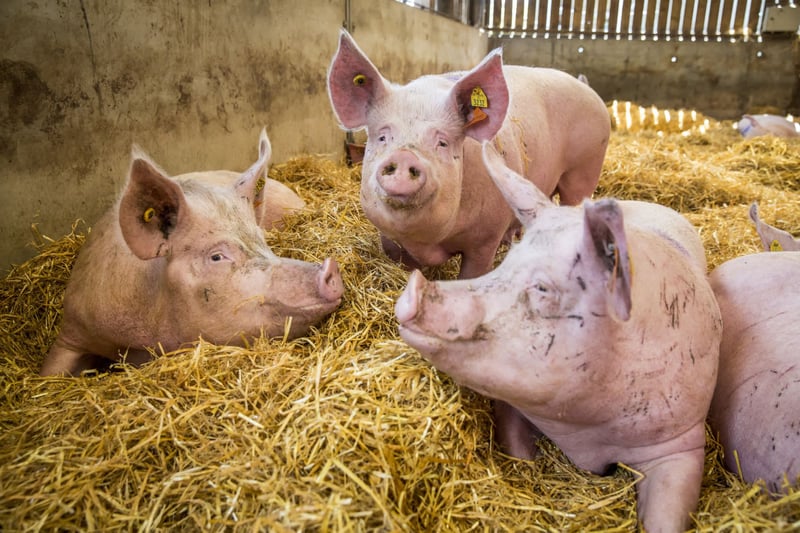
Not convinced you could become vegetarian? Eating less meat is still better for farm animals, the planet and your health
News
As CEO of World Animal Protection, people regularly ask me what they can do to help protect animals. In fact, I was asked that very question by some good friends who came around for dinner at the weekend. I told them to cut out cruelly produced meat from their diets. “Impossible” was their response.
Almost everyone around the table said they’d tried to go vegetarian or vegan at one point, but after a week, most of them said they couldn’t resist a bacon sandwich or a Sunday roast. I then explained that I had actually said “cut out cruelly produced meat” not “no meat” and a heated debate took up much of the evening.
My experience is that lots of people who try to be a vegetarian or vegan end up going back to eating meat. Despite being shocked by pictures and videos showing the conditions billions of farm animals are forced to endure, many people feel they just don’t have the willpower or impetus to even try to cut down their meat consumption.
But, eating humanely doesn’t have to be an all or nothing proposition. If more people started eating a little less, but higher welfare, meat each week they could help the billions of animals who are factory farmed every year. Of the 70+ billion animals farmed annually, 50 billion of them are factory farmed. These animals are treated more like cogs in a machine, than living, breathing, feeling animals. They endure short, miserable lives and are often crammed together in cages, crates or pens where they are unable to engage in natural behaviour. Many animals are even selectively bred to be fast growing; lameness, weakened or broken bones, infections and organ failure are all common place. People really need to think about this when they’re filling up their baskets at the supermarket. By avoiding cruelly produced cheap meat, consumers can support farmers who are doing the right thing.
Progress is however being made in many countries. One of the world’s biggest pork producers, Thailand’s Charoen Pokphand Foods, has made a commitment to remove pigs from cages when pregnant. The company will ensure that 100% of pregnant pigs are in group pens by 2025 for their Thailand based operations. All newly established farms for pregnant pigs will use group pens by the end of this year. These improvements can be, and should be replicated at farms around the world. But, there’s more to do, getting pigs out of cages into social groups, and also giving them materials like straw to manipulate, will mean pigs can be pigs and live, move, play, root, socialise and experience more natural behaviour.
Supermarket chains have tremendous power to create better lives for pigs. New international research carried out by World Animal Protection has found the vast majority of supermarket shoppers around the world are concerned about the treatment of factory farmed pigs, and are willing to change where they shop if a supermarket commits to improving the lives of pigs. Supermarkets need to understand that their customers now expect higher welfare standards for pork products.
It’s also clear that by reducing our meat consumption, there will be less pressure on the farmers who have industrialised their systems in order to meet the excessively high global demand for meat. It’s not just animals that would benefit– my dinner guests would too. According to the British Medical Journal (BMJ) eating less red meat will also reduce your chances of developing cancer, heart disease, stroke, diabetes, infections, kidney disease, liver disease or lung disease.
There are also environmental benefits. Livestock production now contributes nearly 15% of global greenhouse gas emissions, even more than all the cars, planes and other forms of transport put together. Millions of cows raised for meat are belching out tremendous amounts of methane, far more potent than CO2 as a greenhouse gas. Over a 100-year period the “global-warming potential” of methane is 28 times greater than for carbon dioxide. The environmental impact of meat production needs to be taken much more seriously.
It might not be too long though until we can eat meat that doesn’t impact on animal welfare, our health and the environment. Academics and businesses are working flat-out to scale up production of ‘clean meat’, grown from harvested stem cells. It is thought this meat could be appearing in supermarkets in just a few years. Studies have shown that growing meat in labs would substantially cut down on the land and water required. It also found that greenhouse gas emissions would be dramatically reduced, saturated fats can be lowered and the meat would be free from antibiotics and growth hormones.
It’s not just clean meat that has the potential to tackle our farming crisis – plant-based meat alternatives are exploding in variety and popularity. Much of the world has access to an incredible range of vegetables, which are relatively cheap and plentiful.
So, for those who have ruled out going vegetarian or vegan, there are still positive choices that we can make. World Animal Protection is not a vegan or vegetarian organisation, but we do understand the huge effect that eating less, but higher welfare meat can have on the lives of farm animals, your health and the planet.
So if you aren’t vegan or vegetarian make your pledge to cut back on cruelly produced pork and other meat. I have. And to tell supermarkets to source pork from pigs who’ve been raised right.
By Steve McIvor, CEO World Animal Protection.
But, eating humanely doesn’t have to be an all or nothing proposition. If more people started eating a little less, but higher welfare meat each week, they could help the billions of animals who are factory farmed every year.